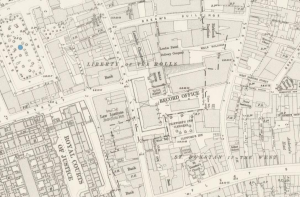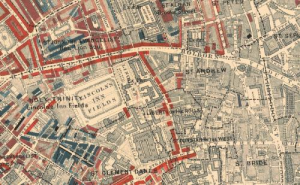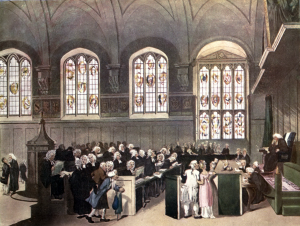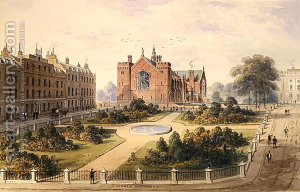Chancery Lane is mentioned once in George Egerton’s “A Lost Masterpiece” and is the location of the story’s climax: “It was near Chancery Lane that a foreign element cropped up and disturbed the rich flow of my fancy.” During my research, I found that Chancery Lane was a middle class area where the “well-to-do” lived. Along Chancery Lane one could find numerous banks and law houses. Two important law buildings that resided in the area were Lincoln’s Inn and Roll’s House. Lincoln’s Inn was home to England’s second most powerful court, the Court of Chancery. Lincoln’s Inn was a court of equity, meaning that it dealt with cases concerning money: wills, monetary fraud, tax raises etc. The atmosphere of Lincoln’s Inn is described as “the best locality for observing the physiology of legal life” (Jackson). The Roll’s House is where the rolls and records of the court are kept.
Outside of Lincoln’s Inn is Lincoln’s Inn Fields. Lincoln’s Inn Fields was considered the handsomest and largest square in London, but was also littered with crime: “beggars by day and of robbers at night” (Thornbury). In Lincoln’s Inn Fields it was not uncommon to find vagrants and cripples who begged for money and went to extremes to come off as pitiful beings.
Chancery Lane as a place of sneaky crime and prestigious court ties in with “A Lost Masterpiece.” In the story, the narrator is traveling through London after having returned from the countryside. After arriving in London, the narrator begins growing ideas in his head that he believes to be the start of a masterpiece. However, once he arrives to Chancery Lane, he sees a woman who “disturbed the rich flow of [his] fancy.” The woman was dressed professionally and was walking with haste. The sight and image of the woman disrupts the man’s thought process and he loses the idea he believed to be brilliant. He gets angry at the woman as if her very presence was a crime within itself: “What business had she, I ask, to come and thrust her white-handled umbrella into the delicate net work of my nerves and untune their harmony?” Although the woman’s presence is not actually a crime, it becomes ironic because of the location.
Works Cited
“Booth Poverty Map & Modern Map (Charles Booth Online Archive).” Charles Booth Online Archive. London School of Economics & Political Science, n.d. Web. 10 Sept. 2015.
Egerton, George [Mary Chavelita Dunne Bright]. “A Lost Masterpiece.” The Yellow Book 1 (Apr. 1894): 189-96. The Yellow Nineties Online. Ed. Dennis Denisoff and Lorraine Janzen Kooistra. Ryerson Universty, 2010. 9 September 2015.
Jackson, Lee. “Victorian London – Legal System – Courts – Chancery.”Victorian London – Legal System – Courts – Chancery. The Victorian Dictionary, n.d. Web. 09 Sept. 2015.
Thornbury, Walter. ‘Lincoln’s Inn Fields.’ Old and New London: Volume 3. London: Cassell, Petter & Galpin, 1878. 44-50. British History Online. Web. 10 September 2015.




